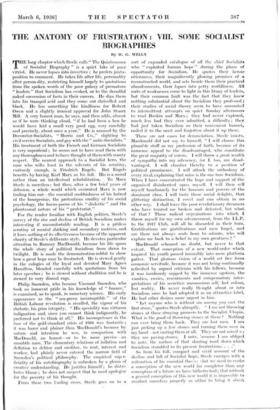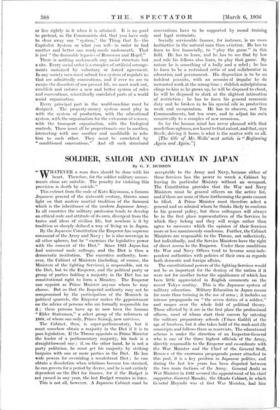THE ANATOMY OF FRUSTRATION : VIII. SOME SOCIALIST BIOGRAPHIES
By H. G. WELLS
Tim long chapter which Steele calls " The Quintessence of Socialist Biography " is a quiet lake of puie vitriol. He never lapses into invective ; he prefers juxta- position to comment. He takes life after life, personality after personality, restricting himself largely to quotations from the spoken words of the poor galaxy of premature " leaders " that Socialism has evoked, or to the dreadful naked succession of facts in their careers. He dips them into his tranquil acid and they come out shrivelled and 'black. He has something like kindliness for Robert Owen and a slightly ironical approval for John Stuart Mill. A very honest man, he says, and then adds, almost as if he were thinking aloud, " if he had been a hen he would have laid a small very good egg, very carefully and precisely, about once a year." He is amused by the Decorator-Socialists, " Morris and Co.," slighting to civil service Socialists, and gay with the " antic-Socialists." His treatment of both the French and German Socialists is very superficial ; he seems not to have read them with any thoroughness and to have thought of them with scanty respect. The nearest approach to a Socialist hero, the man who wilts least in the solvents of his scrutiny, curiously enough, is Friedrich Engels. But Engels benefits by having Karl Marx as his foil. His is a moral rather than an intellectual rehabilitation. To Marx Steele is merciless; but then, after a few brief years of delusion, a whole world which overrated Marx is now finding him out—the essential snobbishness of his hatred of the bourgeoisie, the pretentious crudity of his social psychology, the hocus-pocus of his " dialectic " and the phantasmal nature of his " proletariat."
For the reader familiar with English politics, Steele's survey of the rise and decline of British Socialism makes interesting if uncomfortable reading. It is a pitiless scrutiny of mental shirking and secondary motives, and it loses nothing of its effectiveness because of the apparent charity of Stecle's deliberate style. He devotes particular attention to Ramsay MacDonald, because his life spans the whole story of political Socialism from dawn to twilight. He is made the demonstration-rabbit to show how a great hope may be frustrated. He is stewed gently in the eulogies of the loyal and devoted Mary Agnes Hamilton, blended carefully with quotations from his later speeches ; he is stewed without ebullition and he is stewed to very dismal rags.
Philip Snowden, who became Viscount Snowden, who took an innocent pride in his knowledge of " finance," is examined, so to speak, in monetary science. His early appearance as the " sea-green incorruptible " of the British Labour revolution is recalled, the vigour of his rhetoric, his grim integrity. " His speciality was virtuous indignation and, since you cannot think indignantly, he preferred not to think at all." His incompetence in the face of the gold-standard crisis of 1931 was fantastic ; it was barer and plainer than MacDonald's because by nature and intention he was, in comparison with MacDonald, an honest—or to be more precise—an unsubtle man. The elementary relations of inflation and deflation to debtor and creditor, to rent, interest and worker, had plainly never entered the narrow field of Snowden's political philosophy. The empirical super- ficiality of his autobiography is unbroken by a gleam of creative understanding. He justifies himself ; he distri- butes blame ; he does not suspect that he need apologise for the poverty of his thought.
From these two leading cases, Steele goes on to a sort of expanded catalogue of all the chief Socialists who " exploited human hope " during the phase of opportunity for Socialism. He quotes their heroic utterances, their magnificently glowing promises of a reconstructed world, and sets beside them their practical abandonments, their lapses into petty worldliness. All sorts of weaknesses come to light in this litany of leaders, but their common fault was the fact that they knew nothing substantial about the Socialism they professed ; their studies of social theory seem to have amounted to intermittent attempts on quiet Sunday afternoons to read Ruskin and Marx ; they had never explored, much less had they ever admitted, a difficulty ; they had just taken Socialism as their convenient banner, nailed it to the mast and forgotten about it tip there.
. These arc not eases for denunciation, Steele insists. Macdonald did not say to himself, " I will choose this plausible stuff as my profession of faith, because of its immense appeal to the disadvantaged, who constitute the great majority of voters. I will throw a great wealth of sympathy into my advocacy, for I, too, am disad- vantaged. I will clamber thereby to a position of political prominence. I will attack the orthodoxy of every rival, explaining that mine is the one true Socialism. "%Viten I have concentrated the hope and support of the organised disinherited upon myself, I will then sell myself handsomely for the honours and powers of the dominant class, I will taste those social delights, that glittering distinction, I covet and can obtain in no other way. I shall leave the poor revolutionary dreamers who have trusted Inc broken and defeated, but what of that ? Those radical organisations into which I throw myself for my own advancement, from the I.L.P. to the 1917 Club, will all be discarded in their turn. Gratifications are gratifications and men forget, and are there not always souls born to admire, who will explain MC back to a belief in my own greatness ? "
MacDonald schemed no doubt, but never to that extent. That conception of a new world-order which inspired his youth passed insensibly into mere platform patter. That glorious vision of a world set free from economic servitude, because it was not being continually refreshed by argued criticism with his fellows, because it was insidiously sapped by the immense egotism, the vanities, envies, resentments and compensatory inter- pretations of his secretive unconscious self, lost colour, lost reality. He never really thought about or into Socialism once he had adopted it as an attractive label. He had other desires more urgent in him.
" Let anyone who is without sin among you cast the first stone," quotes Steele abruptly. " I am not throwing stones at these straying pioneers to the Socialist Utopia. What is the good of throwing stones at them ? Nothing can ever bring them back. They are lost men. I am just picking up a few stones and turning them over in my hand-- not casting them at all. They are not missils ; they are paving-stones. I note, because I am obliged to note, the surface of that slanting road down which Socialism stumbled to its present frustrations. . . ."
So from his full, compact and vivid account of the decline and fall of Socialist hope, Steele emerges with a reiteration of his essential thesis: that we need to evoke a conception of the new world far completer than any conception of a future we have hitherto had; that without a general conception of this new world it is impossible to conduct ourselves properly as either to bring it about or live rightly in it when it is attained. It is no good to .pretend, as the Communists did, that you, have only to clear away one ",systern," the Thing that Is—the Capitalist System or what you will—in order to find another and better one ready-made underneath. That . is just " the- damnable legacies of Rousseau and Hegel."
There is nothing underneath any social structure but a site. Every social order is a complex of artificial arrange- Ments sustained by voluntary or forced : agreement. In any society men must submit to a system of regulatic that are admittedly conventions, and if ever we are to escape the disorders of our present life, we must work out, 'establish and enforce a new and _better system of rules and conventions, scientifically_ correlated parts Of a World social organisation.
Every principal part in the world-machine must be designed. The property-Money system must . play in with the system of prodnction, with the educational system, with the organisation for the extension of science, with the transport organisation, with the biological controls. These must all be proportionate one to another, interacting with one another and modifiable in rela- tion to each other. They must be correlated by conditioned conventions." And all such structural conventions have to be supported by moral training and legal restraints.
Socially serviceable finance, for instance, is no more instinctive in the natural man than aviation.. He has to learn to live financially, to " play the game " in this field. He has to learn, and he has to see that by law and rule his fellows also learn, to play that:game. By nature he is somethii,ig. of a bully and a rebel ; he has to learn to be a restrained critic of and collaborator in education and goVernment. His disposition is to be an indolent parasite, with an occasioral impulse to do unwanted work at the wrong time ; childish unhelpfulness clings to him as he grows up, he will be disposed to cheat, he will be disposed to shirk at the slightest intimation of , restriction ; he has to learn his general economic duty and be broken in to his special role in productive work and co-operation. He has to observe, not Ten Commandments, but ten score, and to adjust his code consistently to a complex of new occasions, So far the human mind has never planned with that much thorcughness, nor learnt to that extent, and that, says .Steele, driving it home, is what is the matter, with us all.
[The title of Mr. Wells' neat article is ‘.‘ Beginning Again and Again."] . .

















































 Previous page
Previous page